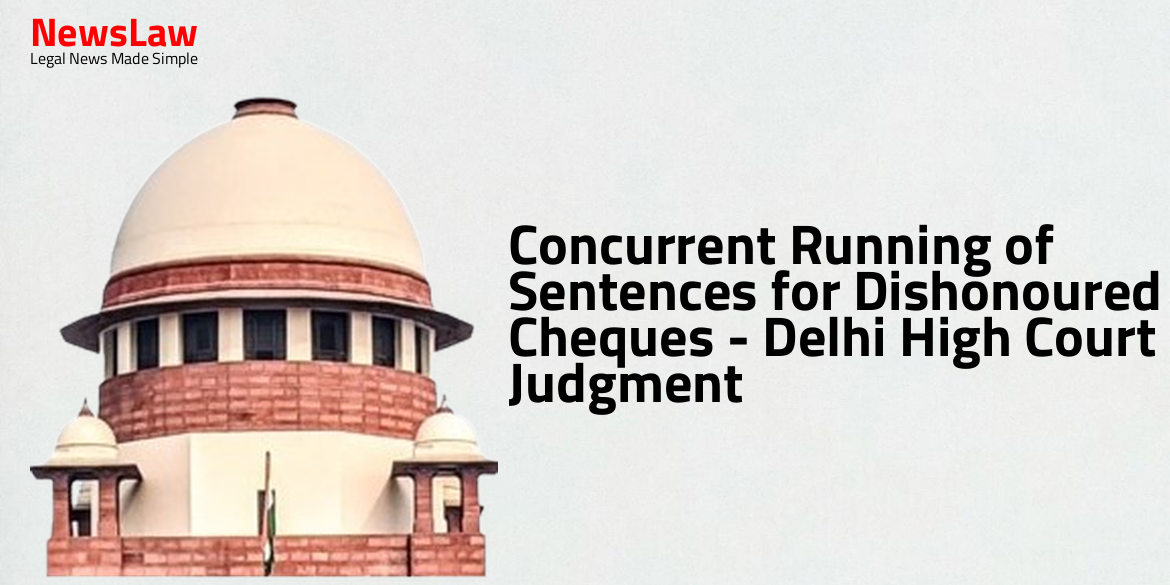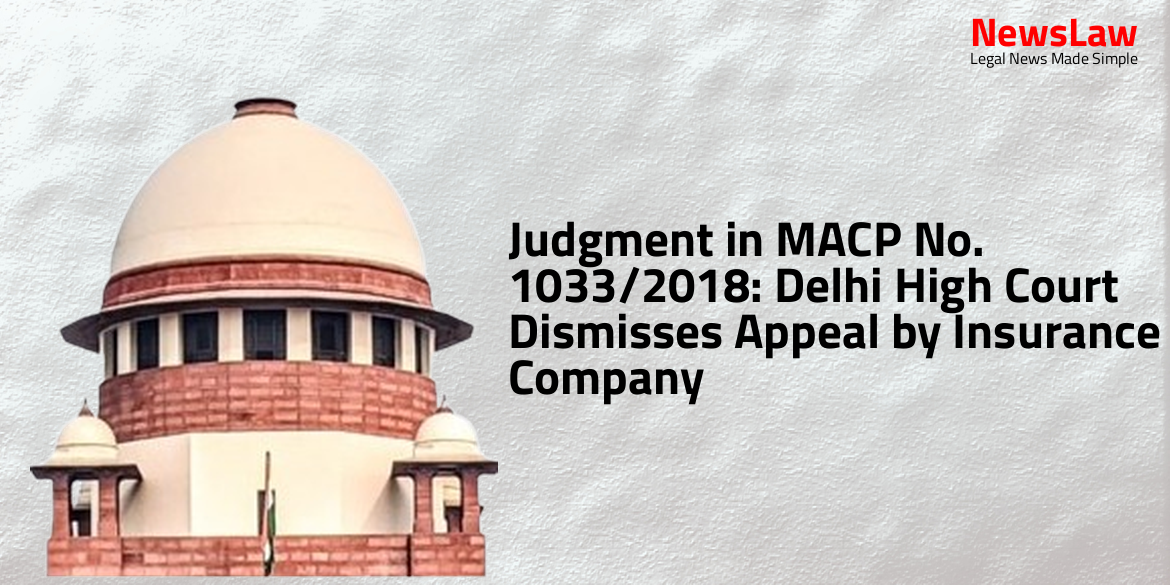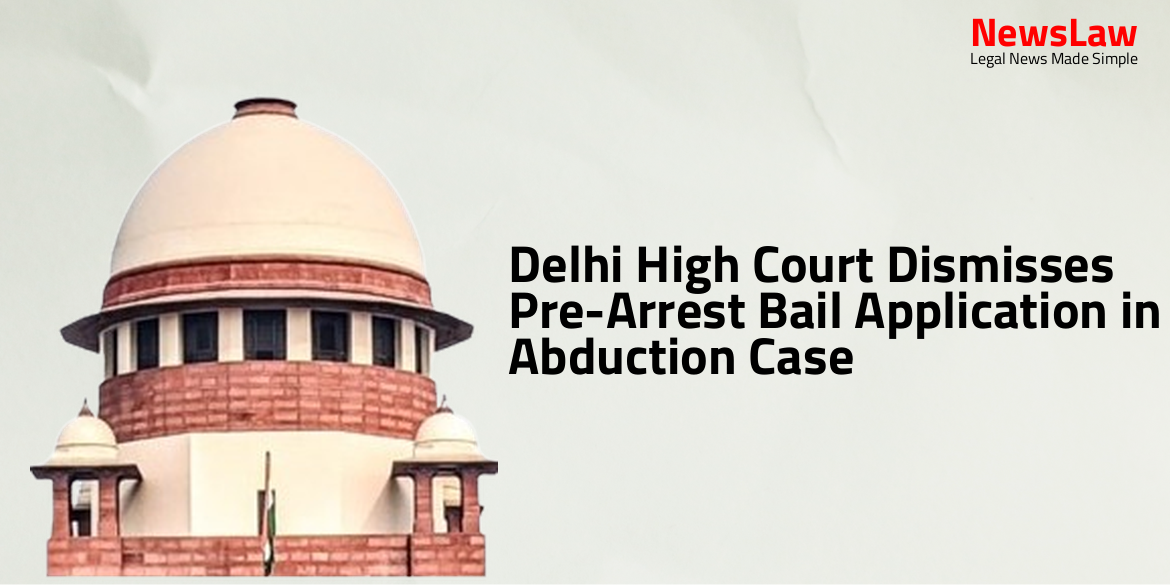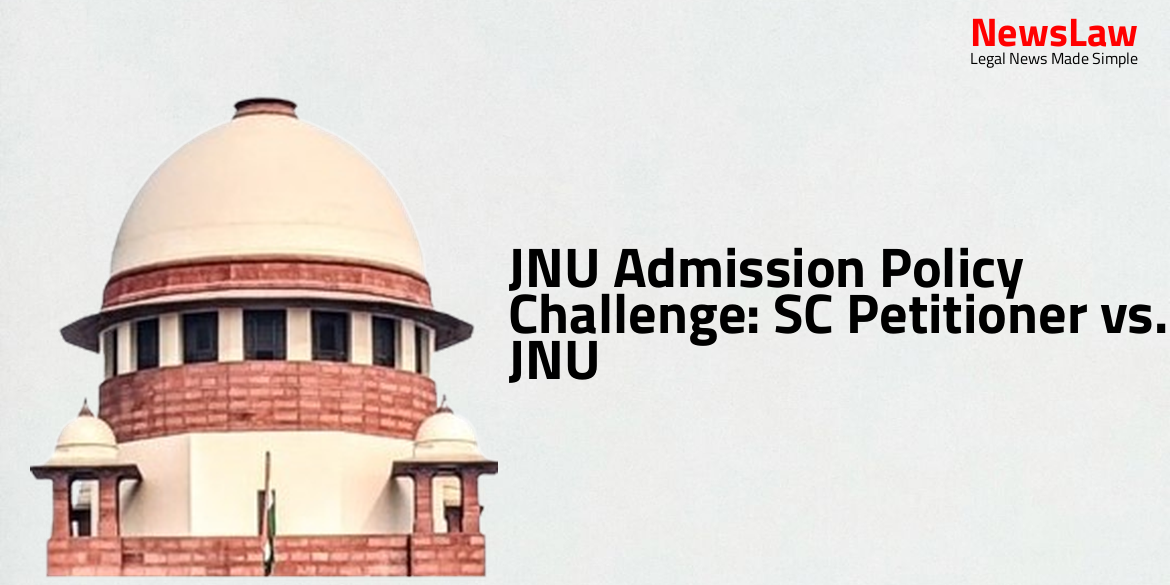In a recent judgment by the Delhi High Court regarding concurrent running of sentences, a ruling was made in the case involving dishonoured cheques. The case, between the petitioner and the respondent, sheds light on the application of Section 427 of the Cr.P.C. for multiple convictions related to the same transaction. The Court’s decision emphasizes the importance of achieving justice through concurrent sentences in cases involving financial transactions. Stay tuned to learn more about the details and implications of this significant judgment.
Facts
- Two complaints filed against the petitioner for offence under Section 138 of the Negotiable Instruments Act were decided on the same day by the Metropolitan Magistrate.
- The complaints were regarding two cheques issued by the petitioner, which were subsequently returned unpaid due to insufficient funds.
- The petitioner has filed a petition seeking the benefit under Section 427 of the Cr.P.C. for the sentences in the two cases to run concurrently.
- No reply has been filed by the respondent no.2 despite the opportunity granted.
Arguments
- The learned counsel for the petitioner cited several judgments to support the argument.
- The Supreme Court judgments in Mohd. Akhtar Hussain v. Asst. Collector of Customs and V.K. Bansal v. State of Haryana & Anr., along with the Delhi High Court judgments in Mukesh Bhatia v. State of Anr. and Dr. Suresh Chand Kuntal v. The State were referred to.
- It was highlighted that the cheques in question were suspend the sentence awarded to the petitioner.
- The petitioner had already served 8 months and 9 days in the second complaint, and a substantial sentence of one year in the first complaint/conviction.
- The suspension of sentence was considered in light of the petitioner’s existing jail time.
Analysis
- Section 427 of the Cr.P.C. deals with the commencement of sentences for multiple convictions for a person already undergoing imprisonment
- If a person is sentenced to imprisonment while already serving a sentence, the new sentence will start after the previous one, unless the Court orders concurrent running of sentences
- Exception is when the person is sentenced to imprisonment while in default of furnishing security under section 122, in which case the new sentence will start immediately
- If a person already serving life imprisonment is sentenced again, the subsequent sentence will run concurrently with the existing life sentence
- Basic rule of thumb is for the sentence to run concurrently where awarded for the same offence
- Court has discretion to order sentences to run consecutively if deemed necessary
- Objective is to achieve justice and not merely mechanical adherence to rules
- The Supreme Court in V.K. Bansal case applied the principle of single transaction rule for concurrent sentences.
- The discretion to direct concurrent sentences should be exercised in favor of the prisoner in cases involving dishonored cheques issued towards repayment of a loan.
- Different complaints related to a single transaction do not prevent the application of concurrent sentences.
- Each loan transaction or financial arrangement is considered a distinct transaction between the complainant and the borrower.
- If different cheques are dishonored in connection to a single loan transaction, concurrent sentences can be directed.
- However, the concession for concurrent sentences is not extended to transactions involving different borrowing companies, even if the appellant is the promoter or director of those companies.
- Direction for concurrent running of substantive sentence limited to the sentence only, not affecting sentence in default of payment of fine/compensation.
- Provisions of Section 427 Cr.P.C. do not allow concurrent running of substantive sentences with sentences in default of payment of fine/compensation.
- Precedents in Mukesh Bhatia and Dr. Suresh Chand Kuntal cases followed regarding running of sentences.
- Cheques in both complaints related to the same transaction between the petitioner and the respondent.
- Complaints were decided on the same day with similar sentences awarded.
- Concurrent running of sentences should apply in this case under Section 427 of Cr.P.C.
- Sentence in the State Bank of Patiala case against M/s Sabhyata Plastics and M/s Rahul Plastics not to run concurrently due to independent transaction.
- Benefit of substantive sentence running concurrently would lead to completion of sentence for the petitioner.
Decision
- The petitioner’s sentence in CC No. 1682/2017 was suspended for 18 months.
- The substantive sentences in CC No. 1682/2017 and CC No. 1683/2017 shall run concurrently.
- The petitioner completed his sentence in CC No. 1682/2017 on 16.11.2022.
- He started serving his sentence in CC No. 1683/2017 on 17.11.2022.
- As of 25.07.2023, the petitioner has spent 8 months and 9 days in custody for CC No. 1683/2017.
- The petitioner has served his full substantive sentence and the sentence for default in payment of fine/compensation in both cases.
Case Title: KARI YADAV Vs. THE STATE & ANR. (2024:DHC:3973)
Case Number: CRL.M.C.-4944/2022



